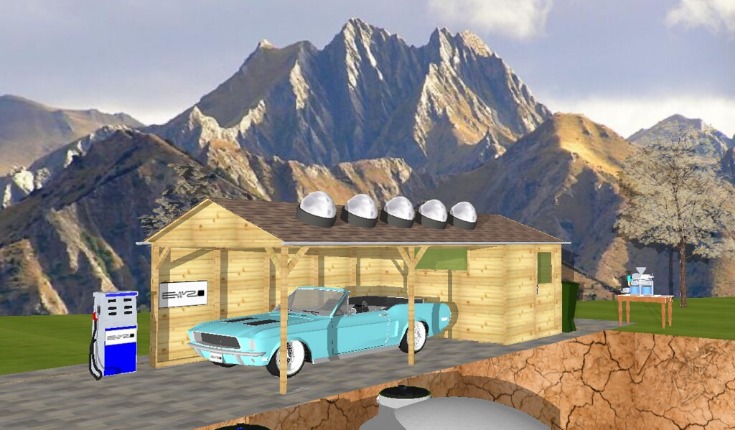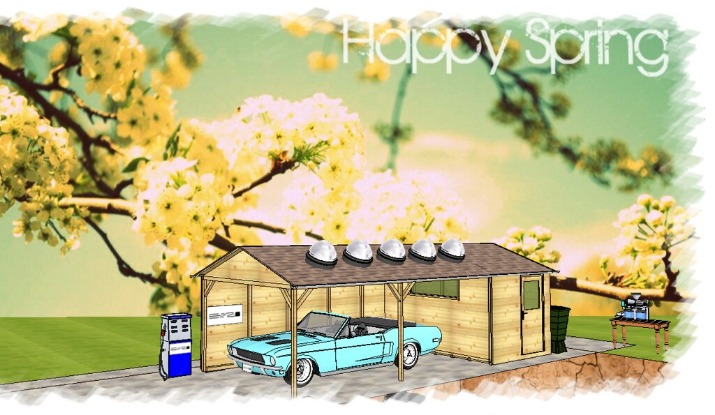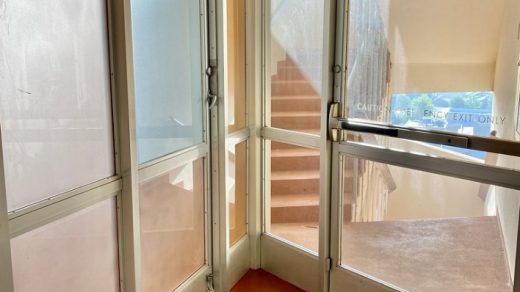Types of Carport Designs
Carport designs come in a variety of styles, each offering different levels of protection, aesthetic appeal, and functionality. From simple, freestanding structures to elaborate, integrated designs, selecting the right carport depends on your budget, space, and personal preferences. Understanding the various types of carport designs can help you make an informed decision that complements your home while providing durable shelter for your vehicle.
Standard Single Carport
A standard single carport is a practical and accessible design that provides shelter for one vehicle, protecting it from weather elements such as rain, snow, and hail. This type of carport typically features a simple structure with a roof supported by posts or columns, offering an affordable and functional solution for homeowners looking to add convenience and protection to their property. Its minimalistic design can easily be customized to match the aesthetic of a home while maintaining cost-effectiveness. Standard single carports are available in various materials including metal, wood, or a combination of both, allowing flexibility in style and durability. They are ideal for small yards or driveways where space is limited yet protection is needed. Overall, this design offers an efficient balance of price, utility, and ease of installation, making it a popular choice among different carport options.
Double Carport
Double carports are a versatile and functional design option, providing shelter for two vehicles side by side. These structures can be customized to complement the style of your home while offering maximum protection against the elements. They come in various styles, including flat roof, pitched roof, and gable designs, allowing homeowners to choose the most aesthetic and practical option for their needs.
Attached Carport
Attached carports are a popular choice among homeowners looking for convenient and integrated vehicle shelter options. These designs are connected directly to the main structure of the house, offering easy access and added protection from the elements. Attached carports can be customized to match the architectural style of the home, providing a seamless look. They come in various styles, including flat roofs, gable roofs, and even vaulted designs, allowing homeowners to select an option that best suits their aesthetic preferences and functional needs. The cost of attached carports can vary based on materials, size, and complexity of the design, but they generally offer an affordable solution compared to fully enclosed garages, making them a practical and stylish choice for many households.
Detached Carport
Detached carports are a popular choice among homeowners looking for a versatile and cost-effective way to protect their vehicles. These structures are separate from the main house and can be customized to suit various aesthetic preferences and functional needs. When considering carport designs and prices, it is important to explore the different styles available to find the best fit for your property.
- Gable Carport: Characterized by a roof with two sloping sides that meet at a ridge, providing excellent drainage and a classic look.
- Flat Carport: Features a flat roof, offering a modern and minimalist appearance, often useful for urban or contemporary homes.
- Pitched Carport: Has a steep or gentle pitched roof, enhancing curb appeal and allowing for snow or rain runoff.
- Lean-to Carport: Attached to the side of a house or building with a single sloped roof, combining functionality with space efficiency.
- African-style Carport: Incorporates decorative elements and unique roof shapes inspired by traditional African architecture, adding distinctive character.
Multi-vehicle Carport
Multi-vehicle carports are an ideal solution for households with multiple vehicles, offering versatile and spacious shelter options. These designs typically feature a larger footprint, capable of accommodating two or more cars simultaneously, and can be customized according to specific needs and available space. Common styles include attached carports, which are connected to a house or building, and freestanding structures that stand independently in the yard or driveway. Materials used for multi-vehicle carports range from steel and aluminum to wood and metal, each providing varying levels of durability and aesthetic appeal. The cost of these carports depends on the size, materials, design complexity, and additional features such as side walls or integrated storage. They provide practical protection from weather elements while enhancing the overall look and value of a property.
Garage-Style Carports

Garage-style carports are a popular type of carport design that closely resemble traditional garages, providing a fully enclosed space for vehicles. These structures often feature walls, doors, and windows, offering added protection from weather and improved security for stored items. Garage-style carports can be made from various materials including wood, metal, or a combination of both, allowing for customization to match the aesthetic of your home. They are ideal for homeowners seeking a seamless and integrated look, as well as those who want the convenience of a garage without the higher costs associated with constructing a fully enclosed building. The prices for garage-style carports vary depending on size, material, and additional features but generally tend to be higher than more basic open designs due to their enclosed nature and additional structural components. Overall, they provide a durable, secure, and attractive solution for vehicle storage, blending functionality with style in a way that complements many residential properties.
Modern & Custom Designs
Carport designs come in a variety of styles to suit different preferences and property aesthetics, offering both functional protection for vehicles and enhancing curb appeal. Modern carport designs often feature sleek lines, minimalist structures, and innovative materials such as steel or polycarbonate, creating a contemporary look that complements modern homes. Custom designs, on the other hand, are tailored to individual specifications, allowing homeowners to incorporate unique features, decorative elements, and specific size requirements to match their overall property style. When considering carport prices, the choice of design significantly influences cost, with simpler, standardized styles generally being more affordable, while elaborate custom designs tend to be more expensive due to additional materials and custom craftsmanship involved.
Materials Used in Carport Construction
Materials used in carport construction play a crucial role in determining the durability, aesthetic appeal, and overall cost of the structure. Selecting the right materials ensures that your carport not only provides reliable protection for your vehicle but also complements the design of your property. From sturdy metals to affordable wood options, understanding the various materials available can help you make an informed decision based on your needs and budget.
Wood
Wood is a popular material used in carport construction due to its natural aesthetics, versatility, and ease of installation. It offers a warm, traditional look that complements many property styles and can be customized in various shapes and sizes. Additionally, wood is relatively affordable and readily available, making it a cost-effective choice for many homeowners. When selecting wood for a carport, it is important to choose durable, weather-resistant types such as cedar, redwood, or pressure-treated lumber to ensure longevity and reduce maintenance needs.
Metal (Steel & Aluminum)
Metal materials, specifically steel and aluminum, are popular choices for carport construction due to their durability, strength, and resistance to weather conditions. Steel is known for its robustness and ability to support large structures, making it ideal for larger carports and those that require additional reinforcement. Aluminum, on the other hand, offers a lighter alternative with excellent rust resistance, which is beneficial in areas with high humidity or frequent rainfall. Both metals can be customized in various designs and finishes to match the aesthetic of your property. The use of metal in carport construction also tends to be cost-effective over time, as these materials require minimal maintenance and have a long lifespan. When considering carport designs and prices, choosing the right metal material can significantly impact the overall durability, appearance, and cost of the structure.
PVC & Vinyl
Materials used in carport construction play a crucial role in determining the durability, aesthetics, and overall cost of the structure. Among these, PVC and vinyl are popular choices due to their affordability, low maintenance, and resistance to weather elements. PVC (polyvinyl chloride) is a versatile plastic material that offers strength and flexibility, making it suitable for various carport designs. Vinyl, a type of PVC, is often used for siding, panels, and roofing options, providing a sleek appearance and long-lasting performance. These materials are lightweight compared to traditional wood or metal, which can reduce installation costs and make customization easier. Additionally, PVC and vinyl are resistant to moisture, insects, and corrosion, increasing the lifespan of the carport. When considering designs and prices, PVC and vinyl options tend to be budget-friendly yet durable solutions that can enhance the overall look and functionality of your carport without extensive maintenance or frequent repairs.
Combination Materials
When considering carport designs and prices, the choice of materials plays a crucial role in both durability and aesthetic appeal. Combining different materials can enhance structural strength while also creating a visually appealing design that complements your property.
- Steel: Known for its strength and longevity, steel is often used in framing and structural components, providing a secure foundation for various design styles.
- Wood: A popular choice for a traditional or rustic look, wood offers versatility and ease of customization but requires regular maintenance to prevent decay.
- Aluminum: Lightweight and resistant to rust, aluminum is ideal for modern carports and can be combined with other materials for sleek designs.
- Polycarbonate or Tempered Glass: Used for roofing panels to allow natural light while providing weather protection, often combined with metal or wood frames.
- Concrete: Often employed in foundational bases or pillars, concrete adds stability and can be finished for aesthetic appeal.
- Combination of Steel and Wood: Provides a balance of durability and warmth, popular in contemporary designs.
- Aluminum with Polycarbonate Panels: Offers lightweight, modern aesthetic with excellent weather resistance.
- Concrete Base with Wooden Frame: Ensures stability while adding a natural, warm appearance.
- Steel Frame with Glass Roofing: Creates a sleek, modern look with natural light entry, suitable for upscale properties.
Factors Affecting Carport Prices
Carport prices can vary significantly based on several key factors that influence the overall cost and design options. Understanding these elements is essential for choosing a carport that fits both your budget and aesthetic preferences. Factors such as material selection, size, design complexity, and customization options play a crucial role in determining the final price of a carport project.
Size and Dimensions
Factors affecting carport prices, size, and dimensions include material choice, design complexity, and additional features. The size of the carport directly influences its cost, with larger structures requiring more materials and labor. Material options such as steel, wood, or aluminum vary in price, impacting overall expenses. Design complexity, including custom shapes or additional features like storage or lighting, can also increase costs. Location and installation requirements may affect transportation and setup expenses. Considering these factors helps determine an appropriate and budget-friendly carport that meets specific needs and preferences.
Material Selection
Several factors influence the pricing and material selection of carports, making it essential for buyers to consider various aspects when designing their structure. The choice of materials significantly impacts both the cost and durability of the carport, with options ranging from metal, wood, to vinyl, each offering different benefits and price points. The size and complexity of the design also play a crucial role, as larger or more intricate structures typically require more materials and labor, increasing their overall price. Additionally, customization features such as added storage, reinforced supports, or unique roofing styles can elevate costs. Local climate conditions may influence material choice, with weather-resistant options like galvanized metal or treated wood being preferred in harsher environments. Furthermore, geographic location can affect shipping and installation expenses, thereby impacting the final price. Overall, understanding these factors helps in selecting the most suitable and cost-effective carport design tailored to specific needs and budgets.
Design Complexity
Factors affecting carport prices and design complexity are numerous and can significantly influence the overall cost and appearance of the structure. The choice of materials, such as metal, wood, or concrete, plays a crucial role, with more durable or premium options generally increasing the price. Design complexity, including custom shapes, intricate roofing styles, or additional features like storage or lighting, also impacts costs. The size of the carport is another critical factor; larger structures require more materials and labor, raising the price. Additionally, site preparation, permits, and integration with existing structures can add to the overall expense. Finally, the level of customization and craftsmanship involved can make a significant difference, with more elaborate and personalized designs typically costing more than standard models.
Installation Location
Factors affecting carport prices and installation location play a significant role in determining the overall cost and suitability of a carport for your property. The choice of location impacts the complexity of installation, accessibility, and potential site preparation expenses. For instance, installing a carport on uneven or rocky ground may require additional groundwork, increasing costs. Additionally, the proximity to existing structures influences the type of foundation and anchoring needed. The climate and weather conditions of the installation site can also affect material choices and design considerations, which in turn impact the price. Proper site assessment ensures the selected design fits the space, complies with local regulations, and meets your budget, making it an essential factor in the overall cost planning of a carport.
Additional Features (e.g., storage, lighting)
Factors Affecting Carport Prices and Additional Features such as Storage and Lighting

When evaluating carport designs and prices, several factors come into play. The size and complexity of the structure significantly influence the cost, with larger and more intricate designs generally being more expensive. The choice of materials, such as metal, wood, or polycarbonate, also affects the price, with premium options often costing more. Additionally, the installation location and site preparation requirements can impact overall expenses, especially if complex groundwork is needed.
Incorporating additional features like storage sheds or integrated lighting can increase the price but add significant convenience and functionality. Storage options are ideal for organizing tools and equipment, while lighting enhances safety and usability during nighttime. The quality and type of these features, along with their installation requirements, are key factors that determine overall costs. Customizations to match specific aesthetic preferences or structural needs will also influence the final price of a carport design.
Average Price Ranges
Understanding the average price ranges for carport designs is essential when planning your installation budget. Carports come in various styles and materials, which directly influence their overall cost. By exploring these price ranges, homeowners can make informed decisions that balance aesthetics, functionality, and affordability for their specific needs.
Standard Single Carport Prices
Standard single carport prices typically range from $2,000 to $5,000, depending on the materials used, design complexity, and location. Basic aluminum or steel carports with simple designs tend to be on the lower end of this spectrum, while customized or premium materials like cedar or other woods may push costs higher. Factors such as foundation requirements, additional features like side panels or lighting, and installation costs can also influence the overall price. It’s important to consider both initial investment and long-term durability when selecting a design to ensure it meets your needs and budget.
Double and Larger Carports
Average price ranges for carports typically vary based on size, material, and design complexity. Standard single-carport installations generally range from $1,500 to $4,000, while double carports tend to cost between $3,000 and $7,000. Larger carports designed for multiple vehicles or with additional features can range from $7,000 up to $15,000 or more, depending on customization and structural requirements. When considering double or larger carports, it’s important to account for the increased material costs and installation complexity, which contribute to the overall price. Options such as metal, wood, and vinyls influence pricing as well, with metal being more durable and typically more expensive than wood or vinyl. Custom designs or added features like ventilation, lighting, and decorative elements will also impact the final cost, making it essential to plan accordingly to meet both budget and functional needs.
Custom & Premium Designs
When considering carport designs and prices, it’s important to understand the typical cost ranges and the options available for custom and premium designs. These choices significantly impact the overall investment and aesthetic appeal of your property.
Average price ranges for standard carport designs generally fall between $1,500 and $4,000, depending on materials, size, and features. Custom designs tend to range from $4,000 to $10,000 or more, offering tailored specifications that match your home’s architecture. Premium designs, which often include high-end materials, intricate details, and unique features, can cost upwards of $10,000, ensuring both durability and a distinctive appearance.
- Basic Carports: $1,500 – $4,000
- Custom Designs: $4,000 – $10,000
- Premium or Luxury Designs: $10,000 and above
Cost-Saving Tips
Finding the perfect carport design at an affordable price can significantly enhance your home’s functionality without breaking the bank. With a few cost-saving tips, you can select a durable, stylish, and budget-friendly carport that meets your needs. Whether you’re looking to update your existing space or build a new one, understanding how to save money during the process can make a big difference.
Choosing Standard Designs
When selecting a carport design, choosing standard models can significantly reduce costs while still providing reliable protection for your vehicle. Standard designs are typically mass-produced, which allows for economies of scale and lower prices compared to custom options. Additionally, opting for a simple, functional design without elaborate features minimizes material and labor expenses. Consider materials like steel or aluminum that are affordable yet durable, and stick to common sizes that fit most vehicles to avoid unnecessary customization costs. Planning ahead and comparing different standard designs can help you find a balance between affordability and practicality, ensuring you get the best value for your investment.
Opting for Cost-Effective Materials
When designing a carport, selecting cost-effective materials can significantly reduce overall expenses without compromising quality. Consider using galvanized steel or aluminum for the framework, as they are durable yet more affordable compared to some premium options. For roofing, asphalt shingles or polycarbonate panels offer budget-friendly alternatives to traditional materials while providing adequate protection from the elements. Additionally, opting for pre-fabricated or modular kits can help minimize labor costs and construction time. By carefully choosing materials that balance affordability and durability, you can create a functional and stylish carport that fits within your budget.
DIY or Professional Installation
When considering carport designs and prices, exploring cost-saving tips can help you make informed decisions. Deciding between DIY installation and professional services is a key factor that impacts overall costs. DIY installation can be budget-friendly and offers a sense of accomplishment, but it requires time, tools, and skills to ensure safety and durability. On the other hand, professional installation provides expertise, guaranteeing proper assembly and adherence to safety standards, which may save you money in the long run by avoiding costly mistakes. To optimize your budget, compare different designs that use cost-effective materials, such as metal or vinyl, and consider simpler structures that are easier to build. Additionally, planning ahead and getting multiple quotes from reputable contractors can help you find the best value. Ultimately, balancing design preferences with cost considerations will ensure your carport is both functional and affordable.
Seasonal Promotions and Discounts
When exploring carport designs and prices, implementing cost-saving tips can help you get the most value for your money. Consider opting for simple, functional designs that meet your needs without unnecessary features, which can reduce overall costs. Shopping during off-peak seasons or promotional periods often yields discounts from manufacturers and installers. Take advantage of seasonal promotions and discounts by staying alert to special offers, holiday sales, or clearance events that can significantly lower the price of your chosen carport. Additionally, comparing quotes from multiple providers ensures you receive the best deal for quality designs suited to your property.


